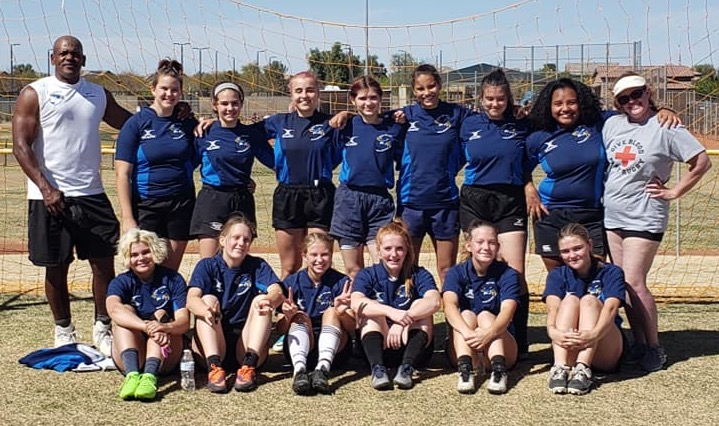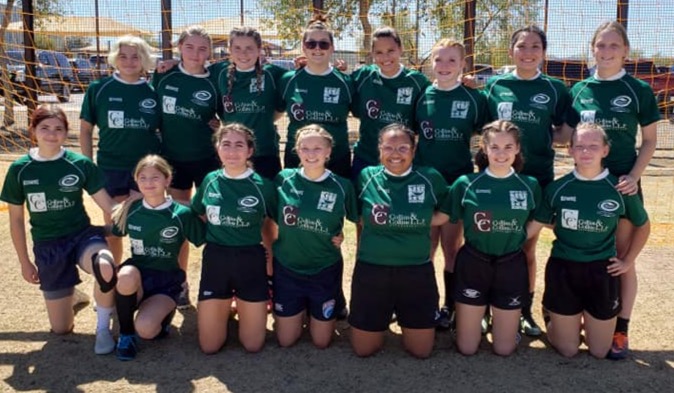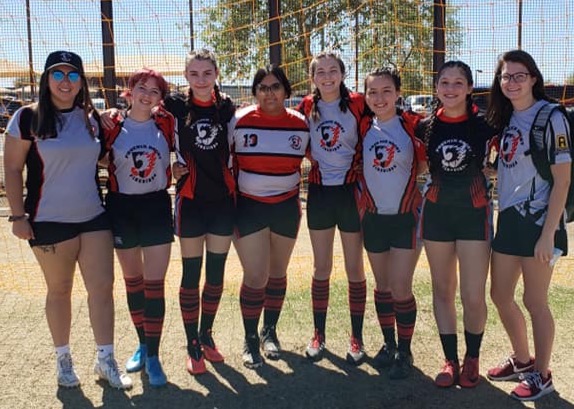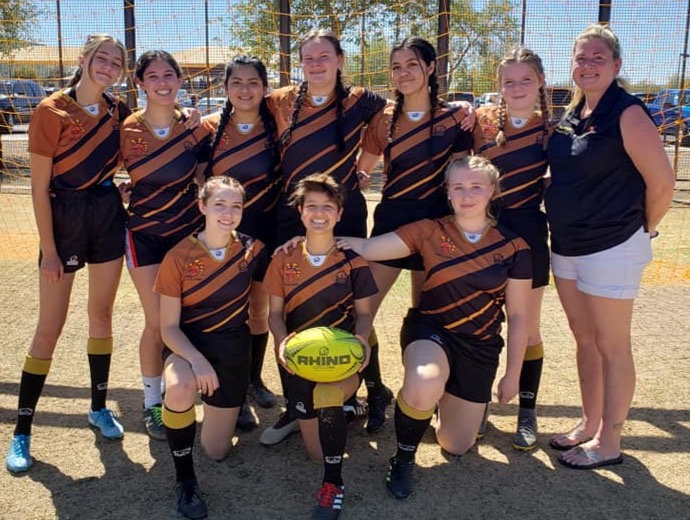High school girls join the Rugby Arizona (RAZ) youth championships this Saturday, as the four U16 teams contest their 7s semifinals in Oro Valley, Ariz. On April 24, the whole girls’ field reassembles, and U16s and U18s will name their champions.
But spring 7s has been much more than a trophy race this year. Covid-19 has disrupted all aspects of life and so the ability to just play rugby was the most important motivator for the season.
“My high school daughter didn’t have homecoming or prom and didn’t care about getting her driver’s license. ‘I have nowhere to go. Why do I care,’” said Alli Crosby, head coach of the U16 North Valley Scorpions. “So my take on the season? It’s got to be about getting the kids outside with friends with a rugby ball after all the BS they’ve been through.”
There was some discussion among coaches and the RAZ board about the best means to accomplish that goal, and ultimately, teams were allowed to combine so games could be played. At the U14 level, Scottsdale had the only stand-alone team, and so RAZ secretary Angela Wagner-Gabbard, who served as girls’ high school commissioner while the position was in transition, assembles a motley U14 squad every tournament so the Wolves have competition. Similarly, numbers wise, only Scottsdale and Sahuarita field U19 teams, and they’ve been playing each other since February.
The U16 division has four teams: Big Dogs, Phoenix Firebirds, Sahuarita and Scottsdale. Big Dogs features players from Cienaga, East Valley, Eclipse, North Valley and Tucson. East Valley coach Mike Webber has taken the lead and works with Tucson’s Wagner-Gabbard and Crosby to unite a disparate roster. He films and edits the team’s games, distributes them to the group, and then a dialogue regarding work-ons and practice items follows. The process has worked really well, and the Big Dogs haven’t lost a match all year.
“When it comes down to it, it’s pretty simple: You’ve got to have that foundation of basics,” Webber said of a uniting strategy. “You have a skill set, you develop it, and you reiterate it. Nothing fancy. Just stick to the basics.”
Webber leans on captain Abi Stafford to be the game-day voice, and the 14-year-old is an excellent leader.
“She’s one of the youngest players at the U16 level but she’s one of our stronger, more mature players,” Webber said. “The girls really respect her. She knows the game and she brings the best out of the rest of the team.”
Aleksandria Gabbard is also only 14 and plays scrumhalf for both the U14 motleys and Big Dogs.
“She’s a very, very good player. Tremendous speed,” Webber said of the Tucson native. “To be so young and to bring what she brings – she’s one of those players who grasps knowledge and understands concepts really quickly. You don’t need to reiterate things with her. She’s a natural.”
Webber also praised newer player Neyma Mottley and her inherent gifts, which she showcases from wing.
“She’s a sleeper,” Webber said. “She doesn’t know the game that well yet so her skill set isn’t very high, but she’s just a hard-nosed, disciplined type of player. She’s really natural in her lateral movement, running left and right.”
Watch for 13-year-old Zoe Schuster from Eclipse as well.
“She came out of nowhere,” Crosby said. “She plays up [an age grade] because of her size, but she’s not just a big girl. She came from lacrosse and has speed and is very athletic, and she sees the game already at this young age. She’s the type who, you show her something once and she can replicate it. And then she pulls out stuff I didn’t even teach her yet. She’s an instinctual player. It’s going to be fun to watch her.”
The Big Dogs take the number one seed into Saturday’s U16 semifinals, and Webber knows the team is excited to play.
“A couple of weeks ago, I started insert a new attacking play [to their repertoire],” Webber said. “We go over it for 15-20 minutes before our games, and maybe they implement it twice a game, give or take. When they execute it like they’re supposed to – like the picture drawn [on a whiteboard] – their whole aura changes. They start trusting each other more, and their confidence goes up.”
On Saturday, the Big Dogs will play #4 Phoenix Firebirds, and head coach Louis Quiroz is eager to see what the playoffs offer in terms of growth.
“It’s been a good season so far,” Quiroz said back in March. “All our new players are growing fast and learning quickly, and everyone plays with pride. Everyone’s improving and has a big smile on their face.”
Quiroz got involved with the Firebirds alongside his children. He volunteered for his son’s team and then when his daughter wanted to play, he took on the U14 and U16 girls’ teams. That was three years ago and today Quiroz is an L200 coach.
Last year, the Firebirds had 35 players, but with graduations and then Covid, the team is down to a full U16 team, and U14 and U19 players who have to join other teams on game days. Quiroz is also involved in the Arizona Bobcats Rugby Academy and has held a couple of talent ID clinics. He’s particularly excited about what’s been coming out of Sahuarita, which is located more than two hours from Phoenix, site of all the tournaments.
“You’ve got to see how they play,” Quiroz said of Jeff King’s outfit in the southern portion of the state. “They’re from a small town and none of the players have played rugby until they step on that field with him. The girls are phenomenal, and I love what the coach has going on. He’s a Marine and has them training hard, and they just keep pushing through every game.”
King and his wife, Angie, also secured U16 and U19 trophies for the girls this year. Sahuarita heads to the playoffs as the No. 3 seed and will play No. 2 Scottsdale in Saturday’s semifinals. As mentioned, these two programs are the only U19 squads in the competition, and they’ll play a single game on April 24 to determine the champion.
“Because there are only two high school [U19] teams, honestly, I’ve seen some [regression] because they play the same team every weekend,” said Emeline Latu, who took over as RAZ Girls High School Commissioner earlier this year. “The girls love to be out there, but they don’t realize that they’re not getting the full realm of experience like when they’re playing three other teams every Saturday.
“But the younger levels have been a lot more competitive,” she continued. “I say that because they’ve had to combine the U14 and U16 teams, and it’s been stellar. You see the girls really progress in their skills since February, because they’re playing against girls that, maybe during a normal season, would be playing U16 or high school.”
Latu got involved in the sport after her daughter tired of competitive volleyball and an uncle suggested rugby as a replacement. Her daughter started with the Firebirds and then moved to Scottsdale. The experience compelled Latu to move her volunteerism from the sideline to the administration.
“She was hooked from the first practice. She’s really found her niche,” Latu said of her daughter. “That’s why I found myself in the commissioner role, because it helped her grow so much personally. I can’t even explain how great this sport has been for her, for our relationship, her academics and the sportsmanship she’s developed. She’s become a totally different person, in a positive way, since finding rugby and I want to help other girls in the state experience that, too.”
Latu’s primary objective is to grow and market the sport to high school girls, their parents and to new areas of the state, and she’ll get good guidance from Wagner-Gabbard. The former Scottsdale and O.P. Lightning player created the Tucson Thunderbirds for the girls four years ago, and then joined the RAZ board when she wanted to give both the southern portion of the state and the girls more presence in the organization. She understands where girls’ rugby can grow and proactively highlights the sport.
“When other sports closed down [due to Covid], we played all through fall and spring,” Wagner-Gabbard said. “We took January off and then started later in February, but we managed to give the girls a 13-week season. They usually have 16 weeks. And the youth had a normal season by stretching into April and May. We’re working hard to grow the sport and we’re taking it seriously.”
Wagner-Gabbard centers her message on the opportunity that rugby can bring high schoolers – from playing NCAA varsity rugby, to claiming scholarship money for college, to traveling around the world with different select sides, to representing the USA one day. She has girls fill out player profiles, so when college scouts start inquiring, it’s an easy exchange of information. Wagner-Gabbard sends her kids to all the camps and exposes them to guest coaches – like University of Arizona and Lightning alumnae Tina Aprahamian, who went on to play for ARPTC, WPL’s Beantown and Ireland’s Suttonians. All of her graduating Thunderbirds are college bound.
“What I love about the Arizona Girls Rugby is they really embody the culture of rugby, because even though they play against each other on weekends and are on different teams, they’re all doing EIRA, Rhinos, Bobcats together,” Wagner-Gabbard said. “They all chat on social media. After the game, it’s, ‘That was a great tackle! So good to see you!’ There’s real camaraderie. We tell them all the time: You never know who you’ll end up playing with on a select side, or a club team, or at the pro level, so treat [your opponent] like your teammate today.”
For more information on Rugby Arizona’s high school girls’ scene, visit https://www.rugbyarizona.com/hsgirlsclubs.






